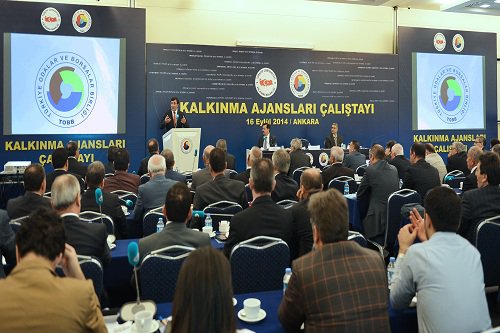Development Agencies Workshop Convened in Ankara TEPAV Director Sak: “Chambers seek to be more active in local development decisions”

ANKARA – Development Agencies Workshop convened in Ankara with the participation of the Minister of Development Cevdet Yılmaz, TOBB President M. Rifat Hisarcıklıoğlu, and heads of chambers and commodity exchanges of 81 provinces.
TEPAV Director Güven Sak delivered a presentation titled “How to Read Development Agencies and the Chamber/Commodity Exchange System Together?” Pointing at TEPAV’s works on local development, Sak said, “Chambers are willing to take an active part in local development decisions.” Stating that the weight of the public sector and central government in the management structure of development agencies should be cut, Sak said that district chambers and commodity exchanges also should be authorized to participate in local decision making processes. Sak added that, agencies’ functions of data collection and provision, planning, and coordination were as important as their role of funding projects.
During his presentation, Sak raised the following questions to the workshop agenda: Is enhancing the private sector among priorities of Development Agencies? Do Development Agencies have sufficient financial resources and incentive tools? Do they allocate their limited resources towards appropriate areas? What are the main areas of cooperation for Development Agencies and Chambers/Commodity Exchanges? Are Development Agencies the voice of the local government or the central government? What would be a healthier management structure for Development Agencies?
“We support the local development approach initiated by development agencies”
Speaking at the opening session of the Workshop, TOBB President M. Rifat Hisarcıklıoğlu highlighted the need to maintain the public-private dialogue on all platforms, and said that TOBB provided financial and non-financial support for the local development approach agencies had initiated. Hisarcıklıoğlu said that the workshop aimed to discuss ways to establish a closer cooperation between chambers and commodity exchanges that represent the private sector, and development agencies that undertake a major role about Turkey’s future. Stressing the importance of local values and cities, Hisarcıklıoğlu added: “The time when decisions would all be made in Ankara to be executed in Anatolia is over. Every province has unique needs. We must implement local goals and work together towards them.”
Cities to be the new brands
Stating that new brands would not be countries but cities, Hisarcıklıoğlu noted over the last 60 years cities had grown rapidly with the number of cities with population over one million increasing from 77 in 1950 to 436 today. Hisarcıklıoğlu added:
"Total population of these cities was then 179 million. Today it is 1.4 billion. By 2025, there will be 616 cities with population over one million and 2.1 billion people will be living in these cities in cumulative. This marks major competition. Those legging behind will lose out. Those which stand out will become star cities.”
Hisarcıklıoğlu stated that there were 5 basic criteria cities had to meet to come upfront in the competition: qualified people, quality of life, private sector-friendly business environment, connectivity with other cities and countries, and strong leadership.
Hisarcıklıoğlu stressed that the cooperation between development agencies and chambers and commodity exchanges was critical for realizing private sector-based development at local level and succeeding in global cooperation.
Development Minister Cevdet Yılmaz
Minister of Development Cevdet Yılmaz stressed that the new regional development approach of Turkey relied on competition and fairness. Yılmaz said, “These two concepts form the core of our new regional policy.”
During his speech, Minister Yılmaz accentuated that Turkey had achieved a certain threshold in development thanks to the reforms carried out over the past 12 years. Stressing that a new development approach was adopted, Yılmaz said that in this context, local-level data was collected for the first time during the preparations for the Tenth Development Plan.
Yılmaz said that the new policy framework was shaped by the concepts of competition and fairness and added: “These two concepts form the core of our new regional policy. We aim to enhance the competitiveness of all regions at the same time, in Istanbul and in Şırnak. We have to achieve this if we want Turkey to be more competitive as a whole. We should improve competitiveness on the one hand and fairness on the other.”
Yılmaz, calling for institutionalization at local level, said that while many countries had brought into action mechanisms similar to development agencies long before and that Turkey lagged behind on that account.
"Development agencies should be supported by everyone"
Minister Yılmaz said that development agencies receive 1.3 billion liras from the central budget, 694 million from municipalities, and 24 million from chambers of trade and industry. and underlined that the share of chambers in overall agency budget was 1.2 percent. Yılmaz added:
"In financial terms, this is not a large support. But we have enacted this provision intentionally. We wish for participation (of chambers) not only in terms of ideas and activities but also in financial terms, so that you have a finger in the pie and you support the process more. We wish that you see development agencies as your own institutions. Our expectation from chambers and commodity exchanges is not particularly financial. What we expect is that you reflect your support and expectations and demands as the private sector to the system and guide development agencies to the right direction."
Yılmaz stressed the role of development agencies as platforms that will contribute to the local programs of various ministries.
Accentuating their will to diversify development agencies on regional basis, Yılmaz said, “We want to maintain certain standards on the one hand and ensure a certain level of diversification on the other. We don’t want development agencies to be carbon copies of one another."
Yılmaz stated that they were open to criticism and added: “Constructive criticism would enhance this institutional structure. This is not only about legal structure. All that the law does not strictly prohibit is legitimate and executable.”
Following the opening speeches, the workshop was closed to the press.














